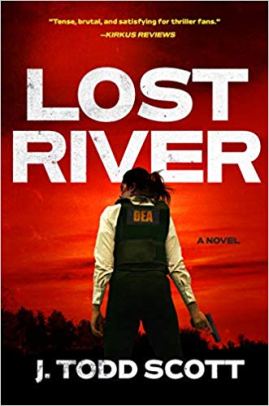On June 23, 2020, author J. Todd Scott will release his next novel, Lost River, a blistering new crime thriller that dives into the opioid epidemic in a way that only he can.
Though he’s known for his Sheriff Chris Cherry novels, Todd’s latest won’t feature the Big Bend County lawman. Instead, Lost River will introduce DEA Special Agent Casey Alexander. Scott, a veteran of the DEA, has consistently churned out hardboiled, headline-beating storylines (his last book dealt with cartels and issues at the southern border) since penning his debut novel, The Far Empty, which came out back in 2016, and readers shouldn’t expect anything different this time around.
That said, there will be some differences—including, for starters, the setting. Whereas the Cherry books are set in Texas, Agent Alexander operates out of Kentucky,
“As most of my Big Bend readers know, I am a twenty-five-year veteran of the DEA,” said Todd in an exclusive statement to The Real Book Spy, “who has combated drug traffickers all over the globe. But I’m originally from Kentucky, and back in early 2002, I had the opportunity to return to my hometown and work undercover cases in the state’s rural communities, predominately tackling the local meth epidemic.
“However,” Scott continued, “I also got an early look at Eastern Kentucky’s ‘pill mills,’ a burgeoning problem that became so notorious years later. As the Nationwide opioid crisis grabbed headlines, I was eventually assigned to Arizona, where I established a task force dedicated to investigating heroin/opioid overdoses. My experiences in Kentucky and the work I did in Arizona prompted me to tackle Lost River.
“The book draws heavily from thinly-disguised “real” events; most of what happens in Lost River has some basis in, or was inspired by, widely-reported stories at the time. All the DEA investigative work in the book is true to life, and the character of Casey Alexander is loosely based on two fantastic female agents I worked with. I hope I made them proud.”
Check out the cover art and plot details below.
 A blistering crime novel of the opioid epidemic–and its cops, villains, and victims–written by a twenty-five-year veteran of the DEA.
A blistering crime novel of the opioid epidemic–and its cops, villains, and victims–written by a twenty-five-year veteran of the DEA.
Angel, Kentucky: Just another one of America’s forgotten places, where opportunities vanished long ago, and the opioid crisis has reached a fever pitch. When this small town is rocked by the vicious killing of an entire infamous local crime family, the bloody aftermath brings together three people already struggling with Angel’s drug epidemic: Trey, a young medic-in-training with secrets to hide; Special Agent Casey Alexander, a DEA agent who won’t let the local law or small-town way of doing things stand in her way; and Paul Mayfield, a former police chief who’s had to watch his own young wife succumb to addiction.
Over the course of twenty-four hours, loyalties are tested, the corrupt are exposed, and the horrible truth of the largest drug operation in the region is revealed. And though Angel will never be the same again, a lucky few may still find hope.
J. Todd Scott has been a federal agent with the DEA for more than twenty years, working cases investigating international maritime smuggling and domestic meth labs, and led a multi-agency strike force dedicated to attacking Mexican cartel smuggling routes. He has a law degree from George Mason University and is a father of three. A Kentucky native, he now resides in the southwest, which provided the backdrop for his novels of the Big Bend.
Readers excited for Lost River can now pre-order J. Todd Scott’s latest anywhere books are sold.
Praised as “One of the hardest working, most thoughtful, and fairest reviewers out there” by #1 New York Times bestselling author Lisa Scottoline, Ryan Steck has “quickly established himself as the authority on mysteries and thrillers” (Author A.J. Tata). Steck also works full-time as a freelance editor and pens a monthly thriller column for CrimeReads. For more information, be sure to follow him on Twitter and Facebook. He currently lives in Southwest Michigan with his wife and their six children.
